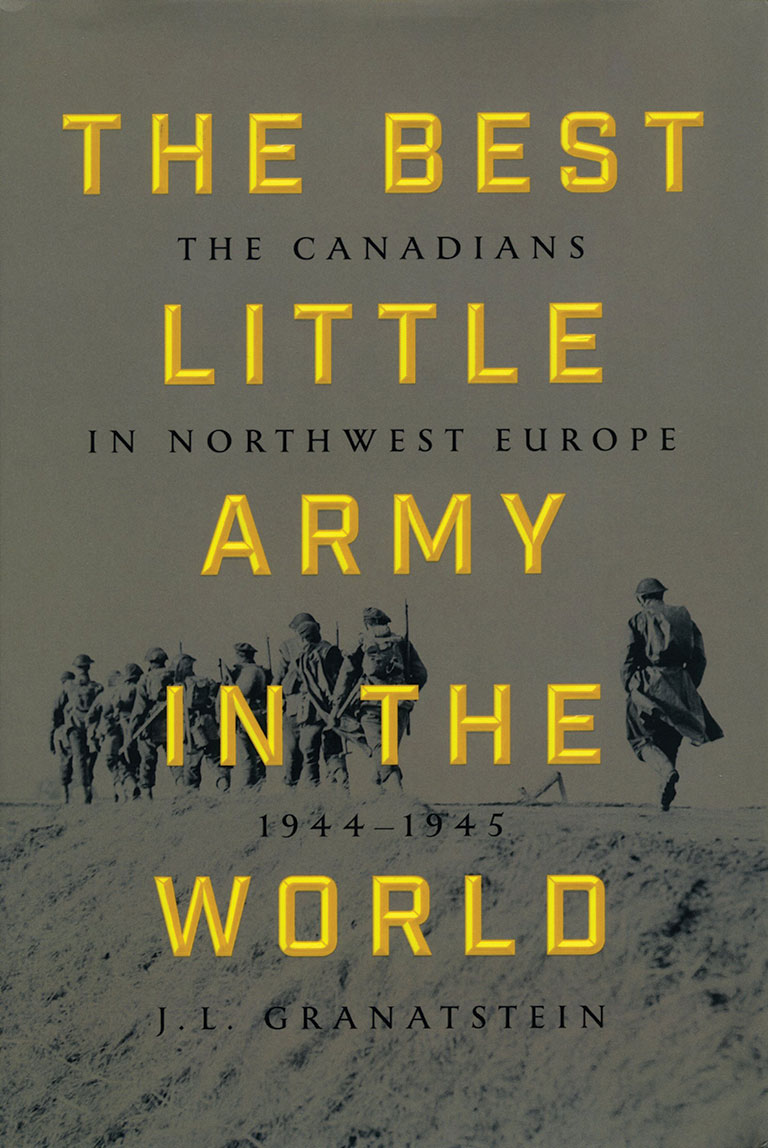The Best Little Army in the World

The Best Little Army in the World: The Canadians in Northwest Europe 1944–1945
by J. L. Granatstein
Patrick Crean Editions
350 pages, $29.36
A double review with
Our Finest Hour: Canada Fights the Second World War
by David J. Bercuson
Harper Collins, 540 pages, $34.99
The American writer Studs Terkel once described the Second World War as the “Good War.” To the extent that any war is good, the one fought against fascism and militarism between 1939 and 1945 certainly lacked moral ambiguity: The good guys and the bad guys were clearly drawn, the cause was noble, and the sacrifice — for some — was worth making.
David Bercuson captures this theme well in the latest edition of his old standby Maple Leaf Against the Axis, now revised, updated, and re-released as Our Finest Hour. His subtitle, Canada Fights the Second World War, reveals the focus of his book: primarily Canadian military operations.
Two of Bercuson’s seventeen chapters are devoted to non-operational issues, one dealing with industrial mobilization and another with Canada’s role within the larger Anglo-American alliance. The rest chronicle the activities of the armed forces from September 1939 to victory in May 1945.
Bercuson knows his stuff, and he has mastered the literature up to 2014. The book traces Canadian naval, air, and army operations around the world and does a good job of setting the how and why of their deployment into the wider strategic context of the war.
He writes well, the text is eminently readable, and Bercuson has infused it with first-person accounts and excellent quotes to capture some of the flavour of the experience.
There is also a little something for those who are interested in the ongoing debates among historians over issues like the “failure” of Operation Totalize to smash through the German lines south of Caen, France, in early August 1944.
Based on the latest accounts, Bercuson has rewritten this section (and many others besides) — and in a footnote he points out that he, too, had been too harsh in his judgment in earlier versions of Maple Leaf Against the Axis. Specialists in any number of fields will find points to quibble with (this one did), but the overall result is the most comprehensive short survey of Canada’s fighting that is available in print.
Jack Granatstein’s latest offering, The Best Little Army in the World, focuses on the operations of First Canadian Army in Northwest Europe between June 1944 and May 1945. Here, too, the title tells us what the book is about.
Over the years, the Canadian Army has taken a beating from friends and foes alike for its apparent failures in the final stages of the Second World War — a stark contrast to the much-heralded triumphs of their fathers and uncles a generation earlier in the Canadian Corps.
For generations of historians, the Canadians were too slow coming off the beaches of Normandy, they failed to take Caen early in the campaign, failed to close the Falaise Gap, failed to take the Scheldt Estuary in a week as Field Marshal B.L. Montgomery had instructed, and failed to burst through the Reichswald-Hochwald defences quickly, despite overwhelming power.
Generations of Canadians believed that their Second World War army — at its peak in 1944–45 — was a pale imitation of the vaunted Canadian Corps that smashed the Germans in the Hundred Days campaign of 1918 (the subject of Granatstein’s previous book).
The interpretation of the Canadians as somewhat bungling enthusiasts has been undermined by recent Canadian scholarship. The Best Little Army in the World draws on that literature, and on Granatstein’s own vast research over the last five decades, to attack that myth.
Where others found the First Canadian Army a glass half empty, Granatstein finds it half full and filling fast as the war dragged on. As he says at the end of the introduction, “Their performance was superb.”
There is much more to be said about Canada’s war effort than what is contained in these two fine books by veteran historians. Canada made an enormous contribution in science, industry, and resource extraction, and modern Canada was forged in the process.
But for Bercuson and Granatstein, our finest hour was what Canadians did at the front — in our commitment of blood and treasure — to liberate Europe from tyranny. The view is laid bare in Bercuson’s afterword, in which he quotes the Talmud: “He who saves one life saves the world.”
For reasons that are perhaps peculiar to Canadians, between 1939 and 1945 we punched above our weight, and these two books tell us how and why.
Bercuson concludes that Canada’s soldiers, sailors, and airmen “helped save the world many times over” during the Second World War. Studs Terkel would have agreed.
Themes associated with this article
Advertisement




